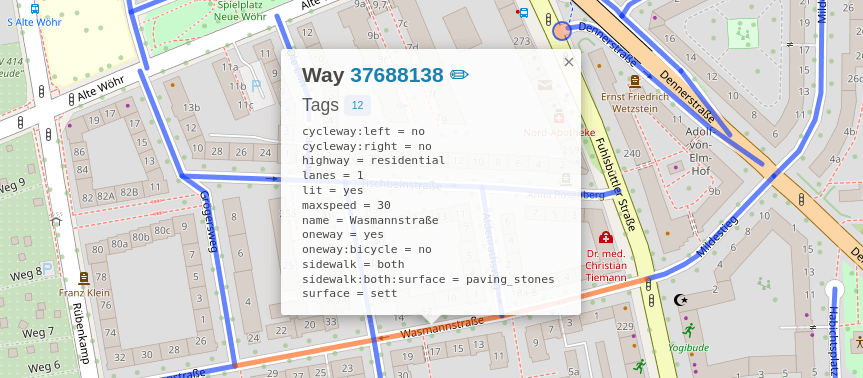A typed async client for the taginfo API, a system for finding and aggregating information about OpenStreetMap's tags, and making it browsable and searchable.
This library makes use of aiohttp for requests, and Pydantic for parsing and validating the responses.
- An overview of modules, classes and functions can be found in the API reference
- The version history is available in RELEASES.md
- The taginfo website, its API documentation, its OSM Wiki page, and its repository
A tag consists of two items, a key and a value. For instance,
highway=residential
is a tag with a key of highway
and a value of residential, which should be used on a
way to indicate a road along which people live.
Now, why is there need for the taginfo API?
OpenStreetMap uses tags to add meaning to geographic objects. There is no fixed list of those tags. New tags can be invented and used as needed. Everybody can come up with a new tag and add it to new or existing objects. This makes OpenStreetMap enormously flexible, but sometimes also a bit hard to work with.
Whether you are contributing to OSM or using the OSM data, there are always questions like: What tags do people use for feature X? What tags can I use for feature Y so that it appears properly on the map? Is the tag Z described on the wiki actually in use and where?
Taginfo helps you by showing statistics about which tags are actually in the database, how many people use those tags, where they are used and so on. It also gets information about tags from the wiki and from other places. Taginfo tries to bring together all information about tags to help you understand how they are used and what they mean.
Before using this library, please be aware of the general rules when using the taginfo API:
Taginfo has an API that lets you access the contents of its databases in several ways. The API is used internally for the web user interface and can also be used by anybody who wants to integrate taginfo data into their websites or applications.
The API is intended for the use of the OpenStreetMap community. Do not use it for other services. If you are not sure, ask on the mailing list (see below).
Always use a sensible User-agent header with enough information that we can contact you if there is a problem.
The server running the taginfo API does not have unlimited resources. Please use the API responsibly. Do not create huge amounts of requests to get the whole database or large chunks of it, instead use the database downloads provided. If you are using the API and you find it is slow, you are probably overusing it.
If you are using the taginfo API it is recommended that you join the taginfo-dev mailing list. Updates to the API will be announced there and this is also the right place for your questions.
The data available through taginfo is licenced under ODbL, the same license as the OpenStreetMap data.
OpenStreetMap® is open data, licensed under the Open Data Commons Open Database License (ODbL) by the OpenStreetMap Foundation (OSMF).
You are free to copy, distribute, transmit and adapt our data, as long as you credit OpenStreetMap and its contributors. If you alter or build upon our data, you may distribute the result only under the same licence. The full legal code explains your rights and responsibilities.
Here is an example of an API request using this library:
from aio_taginfo import key_overview
# either use a temporary session…
response: Response[KeyOverview] = await key_overview(key="amenity")
# …or provide your own
headers = {"User-Agent": "your contact info"}
async with aiohttp.ClientSession(headers=headers) as session:
response: Response[KeyOverview] = await key_overview(key="amenity", session=session)Most endpoints will return a Response[T],
or Response[list[T]] for those returning multiple or paginated items.
This library is in early development and most endpoints are still missing.
| Endpoint | Schema | |
|---|---|---|
| ✅ | /api/4/key/chronology |
Response[list[T]](page=None) |
| ✅ | /api/4/key/combinations |
Response[list[T]] |
| ✅ | /api/4/key/distribution/nodes |
PngResponse |
| ✅ | /api/4/key/distribution/ways |
PngResponse |
| ✅ | /api/4/key/overview |
Response[T] |
| ✅ | /api/4/key/prevalent_values |
Response[list[T]](page=None) |
| ✅ | /api/4/key/projects |
Response[list[T]] |
| ✅ | /api/4/key/similar |
Response[list[T]] |
| ✅ | /api/4/key/stats |
Response[list[T]](page=None) |
/api/4/key/values |
Response[list[T]] |
|
/api/4/key/wiki_pages |
Response[list[T]](page=None) |
|
/api/4/keys/all |
Response[list[T]] |
|
/api/4/keys/similar |
Response[list[T]] |
|
/api/4/keys/wiki_pages |
Response[list[T]] |
|
/api/4/keys/without_wiki_page |
Response[list[T]] |
|
/api/4/project/icon |
PngResponse |
|
/api/4/project/tags |
Response[list[T]] |
|
/api/4/projects/all |
Response[list[T]] |
|
/api/4/projects/keys |
Response[list[T]] |
|
/api/4/projects/tags |
Response[list[T]] |
|
| ✅ | /api/4/relation/projects |
Response[list[T]] |
/api/4/relation/roles |
Response[list[T]] |
|
/api/4/relation/stats |
Response[list[T]](page=None) |
|
/api/4/relation/wiki_pages |
Response[list[T]](page=None) |
|
/api/4/relations/all |
Response[list[T]] |
|
/api/4/search/by_key_and_value |
Response[list[T]] |
|
/api/4/search/by_keyword |
Response[list[T]] |
|
/api/4/search/by_role |
Response[list[T]] |
|
/api/4/search/by_value |
Response[list[T]] |
|
| ✅ | /api/4/site/config/geodistribution |
T |
/api/4/site/info |
T |
|
/api/4/site/sources |
T |
|
/api/4/tag/chronology |
Response[list[T]](page=None) |
|
/api/4/tag/combinations |
Response[list[T]] |
|
/api/4/tag/distribution/nodes |
PngResponse |
|
/api/4/tag/distribution/ways |
PngResponse |
|
/api/4/tag/overview |
Response[T] |
|
| ✅ | /api/4/tag/projects |
Response[list[T]] |
/api/4/tag/stats |
Response[list[T]](page=None) |
|
/api/4/tag/wiki_pages |
Response[list[T]](page=None) |
|
/api/4/tags/list |
Response[list[T]](page=None) |
|
| ✅ | /api/4/tags/popular |
Response[list[T]] |
/api/4/unicode/characters |
Response[list[T]](page=None) |
|
/api/4/wiki/languages |
Response[list[T]](page=None) |
